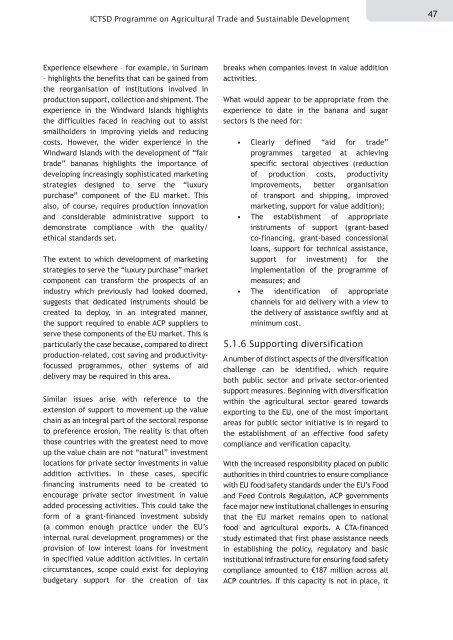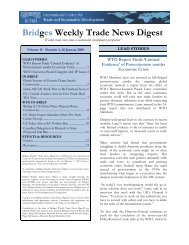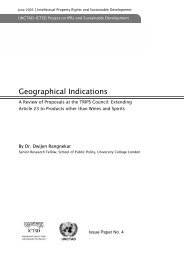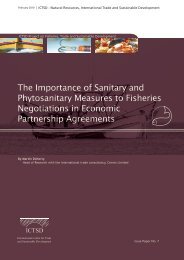Vert 7.indd - ictsd
Vert 7.indd - ictsd
Vert 7.indd - ictsd
- No tags were found...
Create successful ePaper yourself
Turn your PDF publications into a flip-book with our unique Google optimized e-Paper software.
ICTSD Programme on Agricultural Trade and Sustainable Development47Experience elsewhere – for example, in Surinam– highlights the benefits that can be gained fromthe reorganisation of institutions involved inproduction support, collection and shipment. Theexperience in the Windward Islands highlightsthe difficulties faced in reaching out to assistsmallholders in improving yields and reducingcosts. However, the wider experience in theWindward Islands with the development of “fairtrade” bananas highlights the importance ofdeveloping increasingly sophisticated marketingstrategies designed to serve the “luxurypurchase” component of the EU market. Thisalso, of course, requires production innovationand considerable administrative support todemonstrate compliance with the quality/ethical standards set.The extent to which development of marketingstrategies to serve the “luxury purchase” marketcomponent can transform the prospects of anindustry which previously had looked doomed,suggests that dedicated instruments should becreated to deploy, in an integrated manner,the support required to enable ACP suppliers toserve these components of the EU market. This isparticularly the case because, compared to directproduction-related, cost saving and productivityfocussedprogrammes, other systems of aiddelivery may be required in this area.Similar issues arise with reference to theextension of support to movement up the valuechain as an integral part of the sectoral responseto preference erosion. The reality is that oftenthose countries with the greatest need to moveup the value chain are not “natural” investmentlocations for private sector investments in valueaddition activities. In these cases, specificfinancing instruments need to be created toencourage private sector investment in valueadded processing activities. This could take theform of a grant-financed investment subsidy(a common enough practice under the EU’sinternal rural development programmes) or theprovision of low interest loans for investmentin specified value addition activities. In certaincircumstances, scope could exist for deployingbudgetary support for the creation of taxbreaks when companies invest in value additionactivities.What would appear to be appropriate from theexperience to date in the banana and sugarsectors is the need for:• Clearly defined “aid for trade”programmes targeted at achievingspecific sectoral objectives (reductionof production costs, productivityimprovements, better organisationof transport and shipping, improvedmarketing, support for value addition);• The establishment of appropriateinstruments of support (grant-basedco-financing, grant-based concessionalloans, support for technical assistance,support for investment) for theimplementation of the programme ofmeasures; and• The identification of appropriatechannels for aid delivery with a view tothe delivery of assistance swiftly and atminimum cost.5.1.6 Supporting diversificationA number of distinct aspects of the diversificationchallenge can be identified, which requireboth public sector and private sector-orientedsupport measures. Beginning with diversificationwithin the agricultural sector geared towardsexporting to the EU, one of the most importantareas for public sector initiative is in regard tothe establishment of an effective food safetycompliance and verification capacity.With the increased responsibility placed on publicauthorities in third countries to ensure compliancewith EU food safety standards under the EU’s Foodand Feed Controls Regulation, ACP governmentsface major new institutional challenges in ensuringthat the EU market remains open to nationalfood and agricultural exports. A CTA-financedstudy estimated that first phase assistance needsin establishing the policy, regulatory and basicinstitutional infrastructure for ensuring food safetycompliance amounted to €187 million across allACP countries. If this capacity is not in place, it









